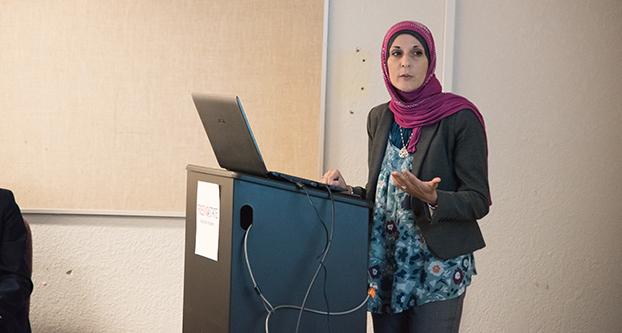A panel discussion at Fresno state Tuesday night provide insight into community efforts to settle 27 refugee families to their new life in America.
Speakers offered their thoughts during the “Refugees Assistance Work in the Central Valley” panel.
Wasan Abu Baker, a fellow with American Friends Service Committee, spoke first about the organization’s services and her personal experience as an immigrant in the United States.
For Baker, the most important service the community can provide to the refugee families is the chance for the families to keep their culture.
“For me as a Palestinian immigrant, I kept what my parents taught me and I passed it to my kids,” Baker said. “But I still go to school, look for [a] job, have American friends but I’m still Palestinian. I can’t hide myself. We want those Syrian families to have that.”
American Friends Service Committee provides events such as Tamejavi to bring refugees and immigrants together in a space where they can share their culture with one another.
“They still have this culture. For me, I will help them preserve this culture and learn how to integrate to the American society keeping this culture,” Baker said. “I don’t want them to lose this culture. I want them to feel confident sharing what they learn. We don’t want them to be the lost generation.”
Kathleen Chavoor from Fresno Interdenominational Refugee Ministries (FIRM), focused her discussion on mental health issues faced by refugees following their relocation.
In her research, Chavoor has found that trauma, depression and anxiety are “culturally specific.”
“There is a western conceptualization of trauma and mental health that is not the same in every culture, in every country,” Chavoor said. “In our minds, [we say] okay these people have experience horrific events, they just need to see a counselor.”
Chavoor said that what works for western countries does not necessarily work for individuals from eastern countries.
“For Middle Eastern people, and for Syrians, healing is actually found within. It’s not found on the outside. Chavoor said. “It’s found within the family center. It’s found within the elders. It’s found within the community. Sending them outside to someone is not culturally responsible.”
As a first generation Armenian woman, Chavoor said her goal is to advocate for “multicultural competent clinicians” available for families in this situation.
“If health is found within the system, calling someone on the phone isn’t going to cut it,” Chavoor said. “Clinicians actually need to join the system and become part of the community. It needs to encompass the community at large.”
Zack Darrah, also from FIRM, also spoke in the panel. Darrah stressed that in addition to the preservation of refugee family cultures, learning English is their biggest asset to acclimation in America.
The support services provided through FIRM are built into different levels incorporating basic English education through the Clovis Adult School and the Fresno Adult School.
It is through tutoring and educational assistance that Fresno State students can become active volunteers.
For Darrah, volunteers should remember that resettling families is a long process, not easily conquered overnight.
“We can’t deny good hearts and we never want to deny basic needs to family but we have to understand that there’s a long-game in resettling families,” Darrah said. “[It’s] much longer that the short-game and the way we typically feel like we should help.”




